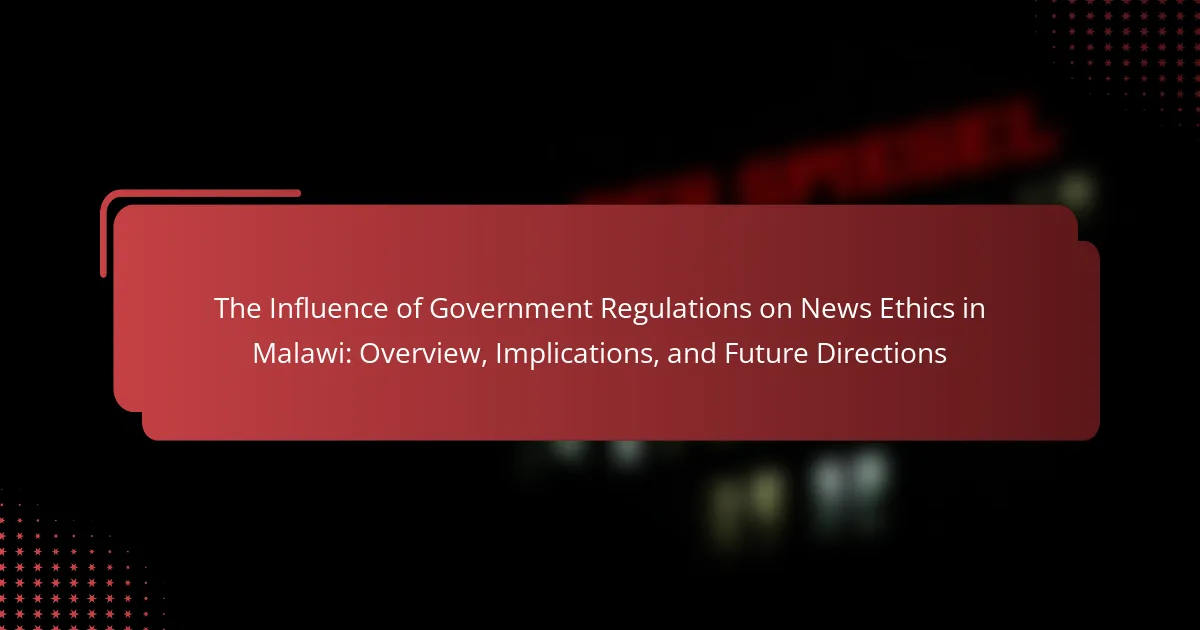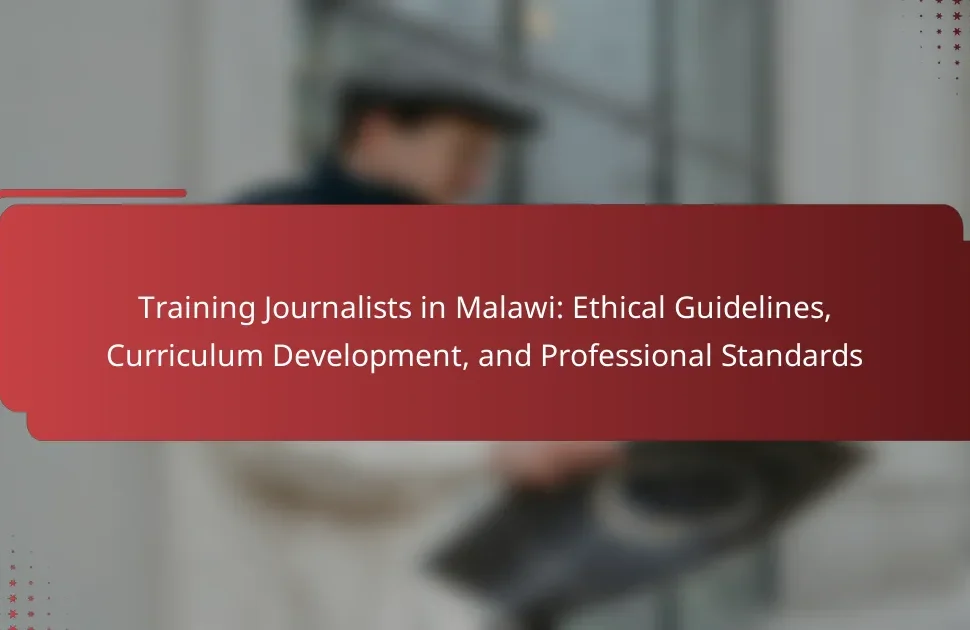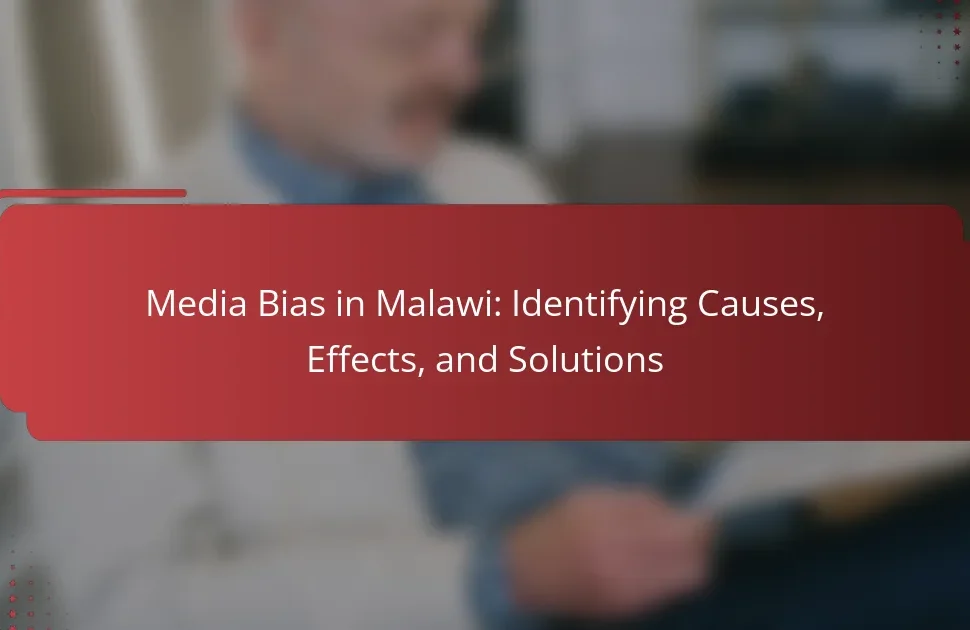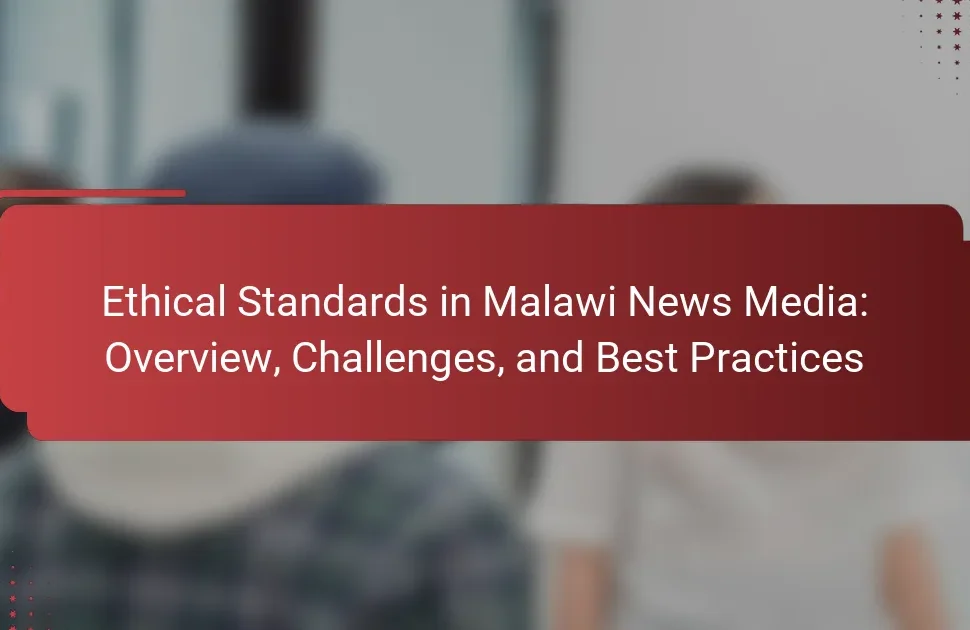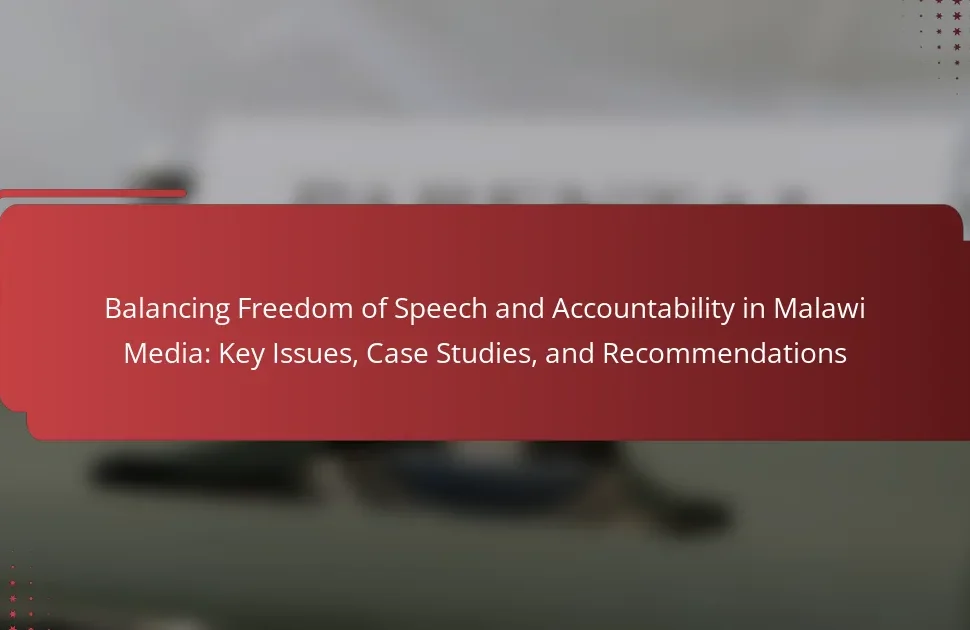The article examines the influence of government regulations on news ethics in Malawi, focusing on key legislation such as the Communications Act, the Penal Code, and the Access to Information Act. These regulations establish standards for broadcasting, address misinformation, and promote transparency in media operations, ultimately aiming to uphold journalistic integrity. The discussion highlights the implications of these regulations on press freedom, accountability, and the potential risks of self-censorship among journalists. Future directions for enhancing news ethics include strengthening regulatory frameworks, promoting ethical reporting through training, and advocating for press freedom to ensure a responsible media landscape in Malawi.
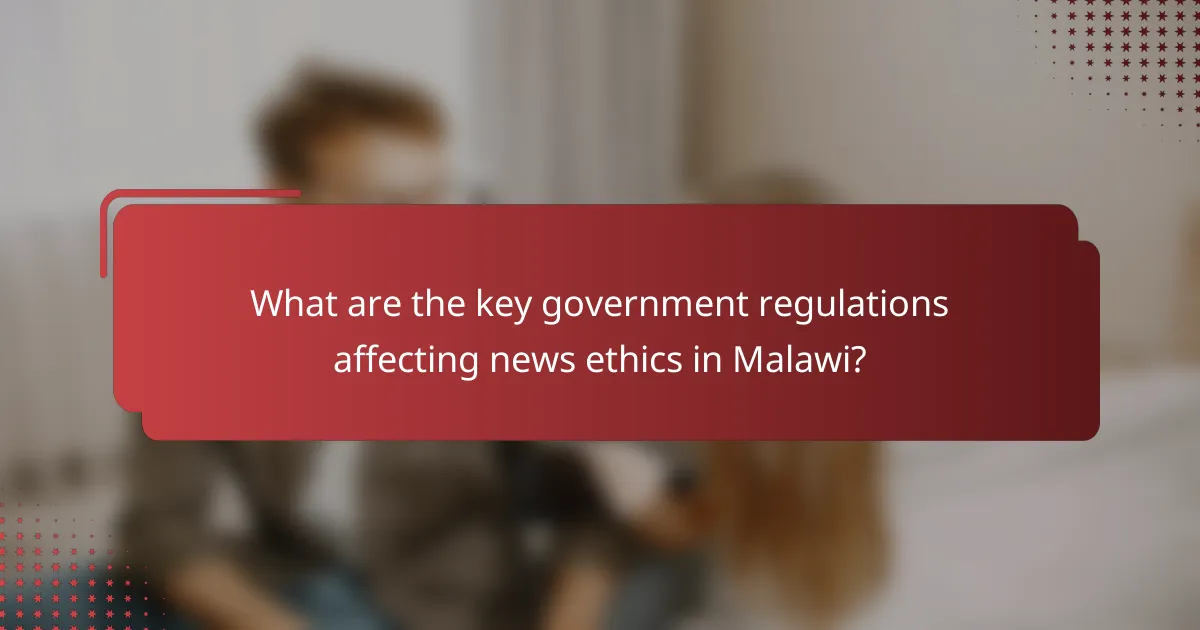
What are the key government regulations affecting news ethics in Malawi?
Key government regulations affecting news ethics in Malawi include the Communications Act and the Penal Code. The Communications Act regulates broadcasting standards and content. It ensures that media outlets adhere to ethical reporting practices. The Penal Code addresses defamation and false information dissemination. This law imposes penalties for spreading misinformation. Additionally, the Access to Information Act promotes transparency in media operations. These regulations aim to uphold journalistic integrity and protect citizens’ rights.
How do these regulations shape journalistic practices?
Government regulations shape journalistic practices by establishing legal frameworks that dictate acceptable reporting standards. These regulations often enforce ethical guidelines to ensure accuracy and accountability in journalism. For instance, laws may require journalists to verify information before publication, reducing the spread of misinformation. Additionally, regulations can protect journalists from censorship, allowing for more investigative reporting. In Malawi, specific laws govern press freedom, which influences how journalists approach sensitive topics. Compliance with these regulations can enhance credibility but may also lead to self-censorship among journalists. Overall, regulations play a crucial role in defining the boundaries and responsibilities of journalistic practices.
What specific laws govern media operations in Malawi?
The specific laws governing media operations in Malawi include the Communications Act of 1998 and the Malawi Penal Code. The Communications Act regulates broadcasting and telecommunications. It establishes guidelines for licensing and content standards. The Malawi Penal Code includes provisions that affect freedom of expression. It criminalizes defamation and other offenses related to media content. The Access to Information Act of 2016 also plays a critical role. This act promotes transparency and public access to information. Together, these laws shape the media landscape in Malawi. They influence how journalists operate and the ethical standards they must follow.
How do these laws impact freedom of expression?
These laws restrict freedom of expression by imposing regulations on media and speech. In Malawi, government regulations can lead to censorship of critical voices. Journalists may face penalties for reporting on sensitive issues. Such consequences discourage open dialogue and limit public discourse. The laws create a chilling effect on free speech. As a result, citizens may self-censor to avoid repercussions. This environment stifles the exchange of ideas essential for democracy. Overall, these laws undermine the fundamental right to express opinions freely.
What role does the government play in enforcing these regulations?
The government plays a critical role in enforcing regulations related to news ethics in Malawi. It establishes laws and guidelines that govern media conduct. These regulations aim to promote accountability and transparency in journalism. The government also monitors media organizations for compliance with these standards. Violations can lead to penalties or sanctions imposed by regulatory bodies. Additionally, the government may conduct investigations into unethical practices within the media. This enforcement is essential for maintaining public trust in news reporting. Historical context shows that government intervention has shaped the media landscape in Malawi significantly.
How does government oversight influence media content?
Government oversight significantly influences media content by establishing regulations that dictate what can be reported and how. These regulations can enforce standards for accuracy, fairness, and objectivity in journalism. In Malawi, the Media Council and the Malawi Communications Regulatory Authority oversee compliance with these standards. This oversight can lead to self-censorship among journalists who fear repercussions from the government. Additionally, government control can limit access to information, impacting the diversity of viewpoints presented in the media. Studies indicate that stricter regulations correlate with a decrease in investigative journalism and critical reporting. Thus, government oversight shapes the media landscape by influencing both the content produced and the manner in which it is delivered.
What mechanisms are in place for monitoring compliance?
Compliance monitoring mechanisms include regulatory bodies, audits, and reporting requirements. Regulatory bodies, such as the Malawi Communications Regulatory Authority, oversee media compliance with laws. Regular audits assess adherence to ethical standards and regulations. Media organizations must submit reports detailing their compliance efforts. Stakeholder engagement encourages transparency and accountability. Public feedback mechanisms allow citizens to report non-compliance. These measures ensure that news organizations uphold ethical practices in Malawi.
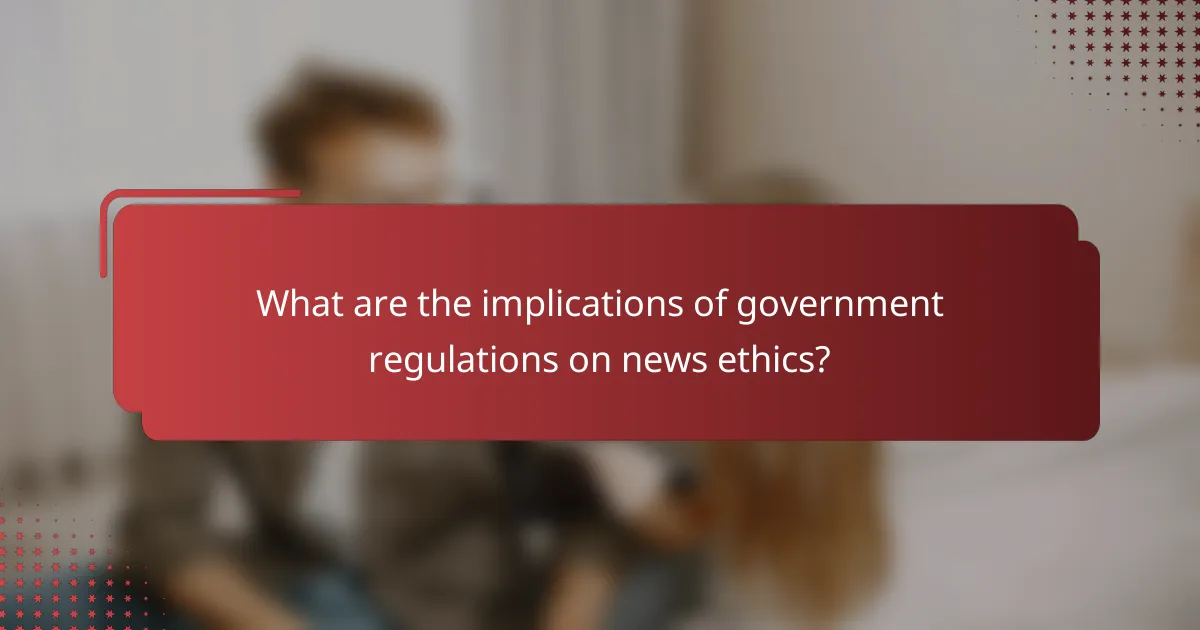
What are the implications of government regulations on news ethics?
Government regulations significantly impact news ethics by shaping journalistic standards and practices. These regulations can enforce accountability and transparency among media organizations. For instance, laws that mandate fact-checking can reduce misinformation. However, overly restrictive regulations may hinder press freedom and discourage investigative journalism. In Malawi, the 2016 Access to Information Act aimed to enhance transparency but raised concerns about potential censorship. Additionally, compliance with government regulations can lead to self-censorship among journalists, affecting the diversity of viewpoints in media. Thus, while regulations can promote ethical journalism, they also pose risks to freedom of expression.
How do these regulations affect public trust in the media?
Regulations can significantly impact public trust in the media. When regulations ensure transparency and accountability, they can enhance trust. Conversely, overly restrictive regulations may lead to skepticism about media independence. In Malawi, the Media Council and other regulatory bodies aim to uphold ethical standards. However, excessive control can create perceptions of bias. Research shows that trust in media correlates with perceived fairness and credibility. A study by the International Journal of Communication indicates that regulatory frameworks influence public perceptions of media integrity. Thus, the balance of regulation is crucial for maintaining public trust.
What evidence exists regarding public perception of media integrity?
Public perception of media integrity in Malawi is influenced by various factors. Surveys indicate that a significant portion of the population views media as biased. According to a 2021 report by the Media Institute of Southern Africa, 62% of Malawians believe that media outlets are influenced by political affiliations. Additionally, a 2020 public opinion poll by Afrobarometer found that 54% of respondents expressed distrust in the media’s ability to report truthfully. These findings suggest a pervasive skepticism towards media integrity among the public in Malawi.
How do regulations influence media bias or neutrality?
Regulations significantly influence media bias or neutrality by establishing standards for reporting and content. These regulations can mandate fairness, accuracy, and impartiality in news coverage. For instance, laws may require equal airtime for opposing viewpoints. This can help mitigate bias by ensuring diverse perspectives are represented. Conversely, regulations can also lead to bias if they favor certain narratives or restrict dissenting voices. In Malawi, the Media Council enforces ethical standards that aim to promote neutrality. However, government influence can compromise these efforts, leading to biased reporting. Historical examples show that stringent regulations can suppress independent journalism, impacting media neutrality.
What challenges do journalists face under these regulations?
Journalists in Malawi face significant challenges under government regulations. These regulations often restrict press freedom and impose censorship. Journalists may encounter legal repercussions for reporting on sensitive topics. This creates a chilling effect, discouraging investigative journalism. Additionally, regulations may limit access to information from government sources. Journalists often face intimidation or harassment for their work. Such challenges hinder their ability to report accurately and freely. The overall environment can lead to self-censorship among media professionals.
How do regulations limit investigative journalism?
Regulations limit investigative journalism by imposing legal restrictions on reporting practices. These regulations can include laws related to defamation, privacy, and national security. Such laws create a chilling effect on journalists, discouraging them from pursuing sensitive stories. In Malawi, specific laws restrict access to information, making it difficult for journalists to gather data. Additionally, regulations can lead to censorship, where media outlets are pressured to avoid controversial topics. This environment makes it challenging for investigative journalists to hold power accountable. Research indicates that stringent media laws correlate with decreased investigative reporting. Consequently, regulations can stifle the essential role of journalism in a democratic society.
What risks do journalists encounter when reporting sensitive issues?
Journalists encounter various risks when reporting sensitive issues. These risks include legal repercussions, such as defamation lawsuits and government censorship. In Malawi, journalists often face threats from authorities aiming to suppress dissent. Physical harm is another significant risk, with reporters sometimes attacked for their coverage. Additionally, journalists may experience psychological stress due to the pressure of reporting on dangerous topics. Economic consequences can arise, as media outlets may face financial penalties for controversial reporting. The environment for journalists in Malawi is particularly challenging, reflecting broader trends in press freedom across the region.

What are the future directions for news ethics in Malawi?
Future directions for news ethics in Malawi include strengthening regulatory frameworks and enhancing journalistic standards. The Malawian government aims to promote transparency and accountability in media practices. Increasing collaboration between media organizations and civil society is essential for ethical reporting. Training programs for journalists will focus on ethical decision-making and responsible reporting. The adoption of digital media ethics will address challenges posed by misinformation online. Advocacy for press freedom will remain a priority to ensure ethical journalism thrives. Monitoring and evaluation of media practices will help uphold ethical standards. These developments are crucial for fostering a responsible media landscape in Malawi.
How can media organizations adapt to changing regulations?
Media organizations can adapt to changing regulations by implementing proactive compliance strategies. These strategies include regularly monitoring regulatory updates and engaging with policymakers. Training staff on new legal requirements is essential for ensuring compliance. Establishing a legal advisory team can provide guidance on navigating complex regulations. Collaborating with industry associations can help media organizations share best practices. Investing in technology can streamline compliance processes and improve reporting accuracy. Finally, fostering a culture of ethical journalism will support adherence to evolving standards. These steps are crucial for maintaining credibility and operational viability in a dynamic regulatory environment.
What best practices can enhance ethical reporting?
Best practices that can enhance ethical reporting include accuracy, transparency, and accountability. Reporters should fact-check information before publication. This reduces misinformation and builds trust with the audience. Transparency involves disclosing sources and potential conflicts of interest. This practice fosters credibility in reporting. Accountability requires journalists to correct errors promptly. Research indicates that adherence to these practices significantly improves public perception of media integrity. A study by the Pew Research Center found that 62% of Americans believe that accurate reporting is crucial for trust in news media.
How can journalists advocate for greater media freedom?
Journalists can advocate for greater media freedom by engaging in public campaigns. These campaigns can raise awareness about censorship and restrictions. Journalists can also form alliances with civil society organizations. Such partnerships can amplify their voices and efforts. Additionally, they can document and report instances of media suppression. This evidence can be used to pressure governments for reforms. International support can also be sought from global journalism organizations. This support can provide resources and legitimacy to their cause. Finally, journalists can participate in legal challenges against oppressive laws. This approach can help to establish precedents for media rights.
What role can civil society play in shaping news ethics?
Civil society plays a crucial role in shaping news ethics by advocating for transparency and accountability in journalism. Organizations within civil society can promote ethical standards through public campaigns and education initiatives. They can also hold media outlets accountable for unethical practices. By fostering dialogue between journalists and the public, civil society can influence ethical norms. Research indicates that civil society organizations in Malawi have actively engaged in media monitoring. They have documented instances of unethical reporting, thus raising awareness. This engagement can lead to improved standards in news reporting and ethical practices.
How can public engagement influence media policy reforms?
Public engagement can significantly influence media policy reforms by shaping public opinion and increasing accountability. When citizens actively participate in discussions about media policies, their collective voice can prompt policymakers to reconsider existing regulations. For instance, public campaigns can highlight issues like censorship or lack of transparency, leading to demands for reform. In Malawi, increased public engagement has led to greater scrutiny of media practices and calls for ethical standards. Studies show that when the public is informed and vocal, governments are more likely to respond to their concerns. This dynamic creates a feedback loop where media policies are continuously evaluated and adjusted based on public sentiment.
What initiatives exist to promote ethical journalism in Malawi?
Several initiatives promote ethical journalism in Malawi. The Malawi Chapter of the Media Institute of Southern Africa (MISA) advocates for media freedom and ethical standards. MISA conducts training programs for journalists on ethics and professionalism. The Malawi Human Rights Commission also promotes ethical journalism by monitoring media practices. Additionally, the National Media Council establishes guidelines for ethical reporting. These initiatives aim to enhance journalistic integrity and accountability in the country.
What practical steps can journalists take to navigate regulatory challenges?
Journalists can navigate regulatory challenges by staying informed about local laws and regulations. They should regularly review updates from regulatory bodies. Building relationships with legal experts can provide guidance on compliance. Training workshops on media law can enhance understanding of regulatory frameworks. Journalists should also develop a clear understanding of ethical standards. Engaging with professional organizations can offer support and resources. Collaborating with fellow journalists can help share strategies for overcoming challenges. Documenting interactions with regulatory authorities can provide evidence in case of disputes.
The main entity of this article is the government regulations affecting news ethics in Malawi. The article provides a comprehensive overview of key regulations such as the Communications Act, the Penal Code, and the Access to Information Act, detailing their impact on journalistic practices, freedom of expression, and public trust in media. It examines how these regulations shape reporting standards, influence media content, and pose challenges for journalists, including risks associated with reporting sensitive issues. Additionally, the article discusses future directions for news ethics, the role of civil society, and initiatives aimed at promoting ethical journalism in Malawi.
